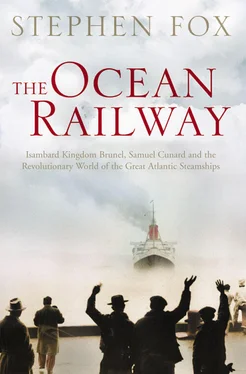When the Cunard Line got under way, the Mac Ivers issued and enforced stringent regulations for their captains and crews. The two primary goals for the enterprise, speed and safety, were to some degree contradictory; to favour one could undermine the other. The Mac Ivers impartially emphasized both. ‘ It will be obviousto you,’ they instructed the commanders of the Cunard ships in 1840, ‘that it is of first importance…that she attains a Character for speed and safety. We trust to your vigilance for this – good steering, good lookouts, taking advantage of every slant of wind, and precautions against fire, are principal elements. ’ At the start of the voyage, the ship was heavily loaded with coal, and the paddles were deeply immersed, not working at peak efficiency. As coal was consumed and the hull rose in the water, the boilers could be fully fired up and the engine pushed harder. But coal use was to be carefully monitored and recorded, along with other supplies in the engine room. Only stokers and trimmers were to carry coal from bunkers to boilers; the sailors up on deck, a separate breed, were not expected to help out.
The Mac Ivers established other rules for the passengers and stewards. ‘ A cheerful acquiescenceis expected in the following Regulations and Suggestions,’ they explained in 1840, ‘which, if in any instance at variance with the opinions, habits, or inclinations of the few, are framed with a regard to the comfort of the whole.’ The staterooms were to be swept and carpets taken out and shaken every morning after breakfast. As soon as passengers left their rooms in the morning, their bedding was turned over, beds were made, wash basins cleaned, and slops emptied. Bed linen was changed on the eighth day, and boots and shoes cleaned overnight and returned to the rooms every morning at eight o’clock. Two towels were provided for each passenger and changed every other day, or more often if requested. The wine and spirits bar, always a favourite part of any ocean voyage, closed for the night at eleven but reopened quite early, at six the next morning. Lights went out in the saloons at half past eleven, in the staterooms at midnight, with no exceptions allowed for late readers.
Other Atlantic steamship lines had similar rules. The difference, it seems, is that the Cunard Line extracted routine obedience to its regulations. In January 1847, Charles Mac Iver found that the officers’ mess in a recent transatlantic voyage had committed ‘ wanton and extravagantwaste of the Company’s victualling stores’, as he put it, and had subverted specific rules ‘which have for their object general comfort and good order’. Unable to discover the particular culprits, Mac Iver sent his prescribed bill of fare to all officers of the mess. ‘I shall be very happy to receive the resignation of any one who is not satisfied with it,’ he warned. ‘No man in this concern has had it in his power to say in truth that he has been otherwise than well treated, but wherever I find a set of men rating themselves only by what they can stow away in their bellies, I have prima facie evidence that they are not the men for the British & North American Royal Mail Service… Specific and known orders shall never be infringed with impunity or trampled upon.’ Was that sufficiently clear? (‘ Mac Iver’s lettersquite discompose one,’ an associate explained; ‘you must talk over the matter with him to understand what a fine fellow he is.’)
As time passed, Mac Iver’s directives became even more definite and specific. His orders to commanders in 1848 ran to eighteen handwritten pages. Each ship was to leave port with enough food and water for thirty days in summer and forty days in winter (though a typical passage took less than half that time). If a very long trip depleted the coal supply, the captain was to put aside enough fuel to run the engine for twenty-four hours and then proceed under sail alone until land was sighted; then the boilers would be fired so the ship could reach port under power. Furthermore: Keep the ship clean to control vermin. ‘Ventilate, Ventilate. ’ Only safely locked lanterns, no open flames, were allowed in the spirits room. No tobacco smoking was permitted anywhere below decks. ‘Want of cleanliness in the water closets is a constant cause of complaint, we shall be glad if you can take any measures to remedy this.’ Every Sunday at sea, the captain must limit unnecessary work and read aloud the Church of England service in the main saloon. Invite a passenger to read from a book of short sermons provided by the line. ‘If this does not meet with a favorable response, do not press it. Let your crew retire.’ Don’t be too friendly with any particular set of passengers, or make or permit generalizations about any national tendencies; Americans and perhaps Englishmen can be quite sensitive about such matters. ‘Card Playing on the part of the Captains on board ship has been the cause of so much dissatisfaction and trouble, that it cannot be longer tolerated.’ Nor should the captain allow card playing or gambling in his private quarters, or in the officers’ mess, or by any officers.
Year after year, voyage after voyage, life on a Cunard ship expressed the flinty personality of Charles Mac Iver. He resisted luxuries and any fancy touches in the food or furnishings or decorations. He most valued safe predictability: always the same procedures and standards, unchanged unless for a very compelling reason. When accidents at sea happened, the captain and crew followed a precise, well-practised drill, and so maintained order. The line’s amazing safety record was no coincidence. Behind it, sustaining it, was Mac Iver standing at the dock every day, getting ready to inspect another Cunard ship and her personnel, missing and excusing nothing. ‘ The highest courtto which you could bring me,’ he once told a parliamentary commission, ‘would be my own conscience.’
For Sam Cunard himself, the responsibility and success of his transatlantic steamship line made him a transatlantic citizen. He and his children were spending longer periods in England, bringing traces of English culture home to Halifax and setting themselves apart from their neighbours. When Fanny Appleton visited the Cunardsin 1841, she noticed ‘the luxury of Mr. Cunard’s house contrasting with the shabbiness of the town’. One of Cunard’s six daughters presided at the meals, ‘a very elegant girl of pale complexion, regular features, very black hair and a fine figure who has been to London and did the honors of lunch and Dinner with quite a distingué air.’ Though Appleton was dressed only in her sailing costume, she was persuaded to stay for dinner, at which the Cunard daughters, ‘a l’Anglaise, arrayed themselves in full dress.’ At table the Cunard girls talked about parties and balls with a determined gaiety; it reminded Appleton of scenes from Jane Austen’s Pride and Prejudice. ‘It all has the strangest Anglo-American aspect,’ she decided. ‘A tedious provincial life they must have of it.’ Eventually all the Cunard daughters but one married English army officers and left Halifax permanently.
For their father, the break was more difficult. ‘ I have beenbackwards and forwards occasionally to England,’ he said in 1847, ‘but Halifax is my home.’ His wife and one of his children were buried there. His extensive business operations were still based in Nova Scotia, and – apparently for sentimental reasons – he held on to his local post as a commissioner of lighthouses despite his frequent absences. But his hometown was not keeping pace with the nineteenth century. ‘ What a slowplace it is!’ exclaimed an American visitor in the 1850s. An English tourist at about the same time chided ‘ the lassitudeand want of enterprise of the Nova-Scotians’, who seemed to be lagging behind other Canadians; ‘the Nova-Scotians appear to have expunged the word progress from their dictionary. ’ Cunard was a modern personality, permanently moored only to his family. He wanted the snap and zoom of modernity. His steamship line, steadily reducing and taming the unruly North Atlantic, imposing human will on nature, embodied the progressive faith of the age. As he shuttled back and forth across the ocean on his ships, he was increasingly drawn away from his fading colonial homeland and towards the ever-beckoning, up-to-date future that he found in commercial England.
Читать дальше












